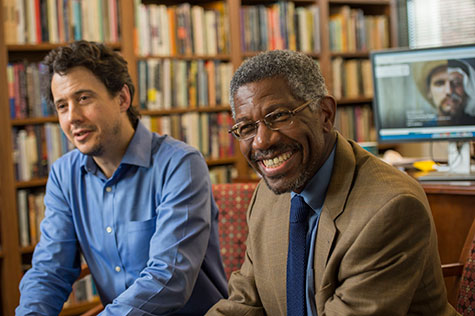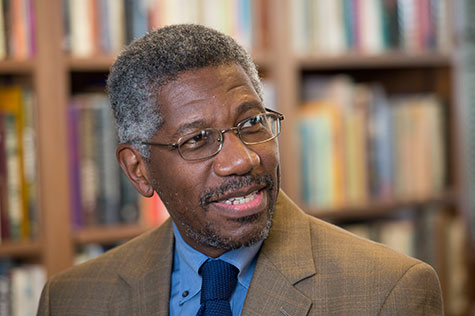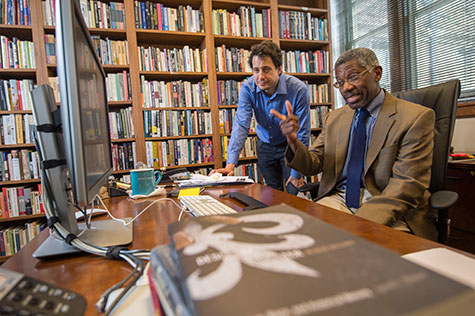
Smart writing on timely topics for the widest possible audience.
This is the mission of The Common Reader, a new online journal launched this fall by Gerald Early, PhD, the Merle Kling Professor of Modern Letters at Washington University in St. Louis.
A noted essayist and American cultural critic, Early is a professor of English and of African and African-American Studies, both in Arts & Sciences. His books include “The Culture of Bruising: Essays on Prizefighting, Literature, and Modern American Culture,” which won the 1994 National Book Critics Circle Award for Criticism, and most recently “A Level-Playing Field: African American Athletes and the Republic of Sports” (2011).
We sat down with Early and Managing Editor Ben Fulton, a former reporter for the The Salt Lake Tribune, to discuss The Common Reader, online journalism and the continuing value of ink and paper.
Describe the mission of The Common Reader.
Early: The Common Reader aims to give Washington University a place at a certain table. We want to help shape the national conversation, and debate, about essential issues of our time.
In some ways, by launching the journal, we’re making a series of determinations — about what those issues are, about who is discussing them, and about what we think good writing means.

Talk about the name. What does The Common Reader signify to you?
Early: Two things. First, it signifies the idea of reaching all readers — of developing a community of people who want to read good prose and have good discussions about important issues.
The name also has a literary pedigree. It was used by Samuel Johnson, by Virginia Woolf … We want people to think of The Common Reader as a place where strong individual voices speak to readers and also to one another.
But this is not a place that requires specialist knowledge. The Common Reader is written for anyone who loves good writing and the expression of good ideas. If you come to us with intelligence and the ability to read, our pages will be accessible to you.
Sort of a jargon-free zone?
Fulton: Exactly. It’s a publication without barriers. It’s smart and rigorous but also welcoming. If you come to The Common Reader, you’ll be rewarded with good writing on timely subjects.
Early: It also represents a new way for the university to connect with the broader world. The Common Reader is all about being smart, not just being academic.
Talk about the structure of the website. How frequently will it be updated?
Early: The site will be updated several times a week, and oftentimes daily. In addition, two or three times a year, we’ll roll-out a series of coordinated articles, all exploring a particular theme or topic. We want to capture the dynamism of ideas and the dialogue surrounding them.
Fulton: It’s like looking at a sculpture. From one angle it looks one way, but from another perspective it looks completely different. So for each themed “issue,” we will assemble a number of people, each at the top of their fields, each addressing a particular aspect from a particular perspective.

You’ve launched with “The Language Issue,” which includes features by top linguists, working reporters and an international detective novelist. Why language?
Fulton: Language informs almost every interaction we have, whether it’s writing a love poem or gassing up the car.
Early: I thought language would be easy! (Laughs.) For me, it’s like Christians returning to the early church. Language is the fundamental basis upon which human beings construct ideas.
It’s also a subtle tribute to the humanities. I don’t think of The Common Reader as a humanities journal per se, but humanistic language is the prism through which we understand almost everything. In the end, even scientific knowledge is presented using the same language you use to talk about other subjects.
What other issues do you have planned? What can readers look forward to?
Fulton: The next issue will look at food and GMOs (genetically modified organisms). After that, we’ll have an issue on music, so far largely populated thanks to music critic Greil Marcus, who is on our editorial board, which also includes renowned documentary filmmaker Ken Burns and noted St. Louis novelist Curtis Sittenfeld. After that, we hope to tackle such broad topics as money and aging in compelling, novel ways.

GMOs seem particularly resonant here in St. Louis. The city is home to some major players in that arena.
Fulton: I think it’s important to not be afraid of a contentious topic. GMOs are really interesting in that they play into a lot of anxieties about the modern world, about technology and even medicine. We live in an era when people have become more and more accustomed to questioning science and its applications in life and health. It even bleeds into the current fear of vaccines — a phenomenon I find just shocking.
But where does that anxiety come from? And is it justified?
In addition to the website, you’re planning to print a “best of” annual edition. Why stick with ink and paper?
Early: Print is part of a long tradition of letters and literacy in the world. The Common Reader was created, in part, to honor that tradition, not to destroy it. So while we’ll always have a robust presence on the Web, we want to also publish a print annual compiling the best of the journal’s offerings.
We also just want to give people the experience of holding something in their hands. As wonderful as the Internet is, there’s an exhausting quality about it. A book has a beginning, a middle and an end.